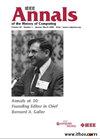编者的话
IF 0.7
3区 哲学
Q4 COMPUTER SCIENCE, THEORY & METHODS
引用次数: 0
摘要
本期刊登了一组内容丰富的文章。第一篇文章是贝尔纳多-贡萨尔维斯(Bernardo Gonçalves)撰写的 "拉芙蕾丝女士的反对"(Lady Lovelace's Objection),是 2023 年 7 月至 9 月欧洲人工智能特刊的续篇。贡萨尔维斯分析了道格拉斯-哈特里和阿兰-图灵之间的一场辩论,前者是计算机械专家,后者则以讨论人工智能等许多话题而闻名。这场辩论部分是在 1951 年英国广播公司(BBC)的广播中进行的,是对数字计算能力感兴趣的早期迹象。本文章由计算机程序翻译,如有差异,请以英文原文为准。
From the Editor's Desk
We have a varied group of articles in this issue. The first, by Bernardo Gonçalves, “Lady Lovelace's Objection,” continues the July–September 2023 Special Issue on Artificial Intelligence in Europe. Gonçalves analyzes a debate between Douglas Hartree and Alan Turing, the former an expert on computing machinery and the latter, well-known for his discussions of AI, among many other topics. The debate was conducted in part in 1951 BBC radio broadcasts, an early indication of interest in the capacities of digital computing.
求助全文
通过发布文献求助,成功后即可免费获取论文全文。
去求助
来源期刊

IEEE Annals of the History of Computing
工程技术-计算机:理论方法
CiteScore
0.80
自引率
28.60%
发文量
88
审稿时长
>12 weeks
期刊介绍:
The IEEE Annals of the History of Computing serves as a record of vital contributions which recount, preserve, and analyze the history of computing and the impact of computing on society. Where possible, first hand accounts of events and activities are recorded with minimal editorial change, and scholarly reports of analyses of the historical record from archives and personal contact are published so as to better understand both the past and the future of our field.
 求助内容:
求助内容: 应助结果提醒方式:
应助结果提醒方式:


